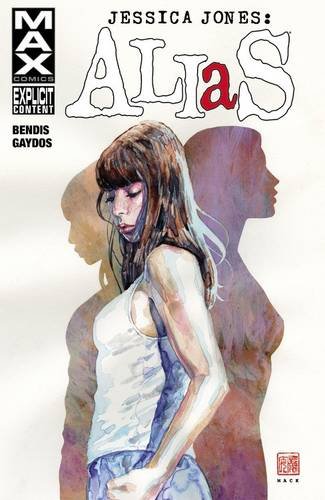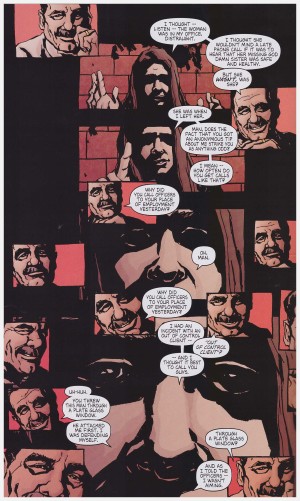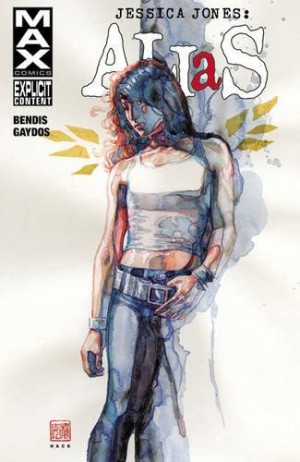Review by Frank Plowright
When deciding to relate stories of a private eye operating on the edges of the superhero community, Brian Michael Bendis rejected the previous attempt, Dakota North, as too glamorous and competent. Instead he created continuity implant Jessica Jones, a woman who was once a superhero, and retains her powers, but whose life has fallen to pieces.
Bendis is on home territory here, having cut his comic teeth on crime graphic novels such as Goldfish and Jinx, but has now refined his narrative techniques. There’s a noticeably better sense of pacing, and he doesn’t have to draw the material either as Michael Gaydos is there for that, and does a fine job presenting the gloomy half life that is Jessica’s world. He accentuates the tedium and closed-in aspects by packing a page with small images, or repeated images, or minor variations on images, and the entirety is a claustrophobic womb. There are occasions where the art isn’t quite encompassing the dialogue, with the creators not having an entirely harmonious collaboration, but that’s resolved by the end of the first arc here.
There are so many smart aspects to this opening volume. Little moments, big moments, a spectacularly seedy and intense interrogation scene. At one point Jessica is asked by Daredevil whether she murdered someone. She denies it and the scene moves on, yet for those that know, it’s a nice touch as Daredevil is able to hear a heartbeat, so in effect acts as a human lie detector. Luke Cage, at that time woefully under-used had his rehabilitation kick-started with a guest slot here, and there’s an entire story concentrating on superhero sidekick Rick Jones. While not completely successful, it provides the opportunity for a few Bill Sienkiewicz illustrations, not seen too often these days, and in some ways is a meta-commentary on depictions of people in comics. Explaining why would ruin the story, and it’s worth reading.
Best of all is the depiction of Jessica herself, as Alias, for all the whip-smart dialogue and superhero background trimmings, is primarily an extended character study. Most superheroes are supremely confident, yet she’s barely functional. Her self-destructive tendencies are no story arc gimmick, and comprehensive thought has been applied to her background, which rolls out over the series. When the reasons for her current state are later explained (in The Secret Origins of Jessica Jones, or volume 4) they horrify and justify.
Some will be offended by the barrage of swearing. There’s definitely an element of Bendis pushing the boat out, but equally everyone knows folk who should probably wash their mouth out with soap and water on an hourly schedule. Realism or gratuitous shock? You decide that for yourself.
It’s the opening six chapters that are the strongest. Jessica is hired to locate the missing sister of a concerned woman, and in the course of tracking her down discovers a superhero’s civilian identity. The plot expands in a masterful, devious and unpredictable manner, with Jessica’s narration captions explaining both her state and her methods, and cranking up the difficulty of contact with people who were once close friends.
Bendis’ conception of Jessica Jones has been adapted for an acclaimed Netflix TV series, and those curious will find much of what made video screens here on the pages. The next book is titled Come Home in earlier editions, or just Volume 2 in the most recent printings, and there’s also an oversize hardcover Omnibus gathering all four volumes.






